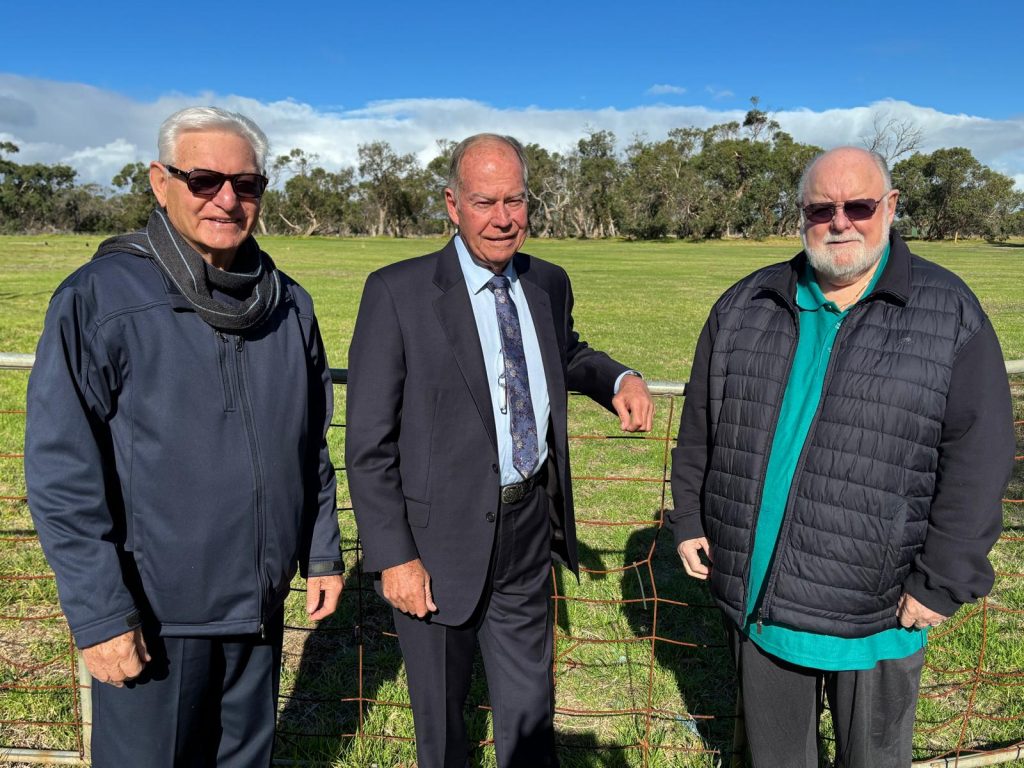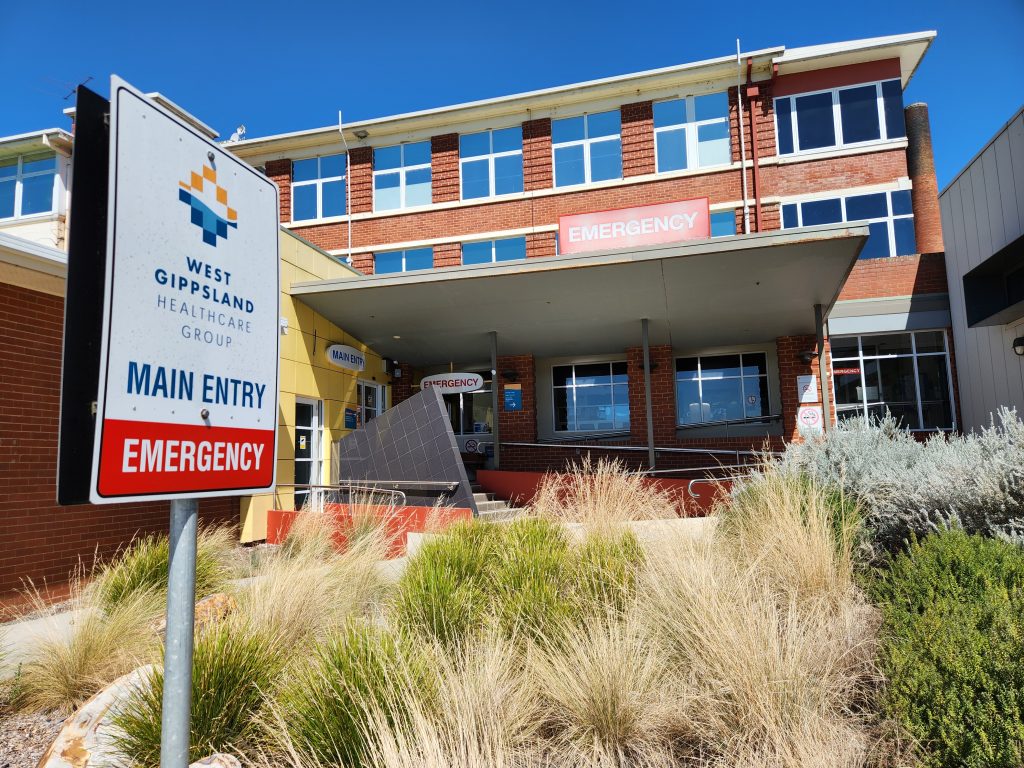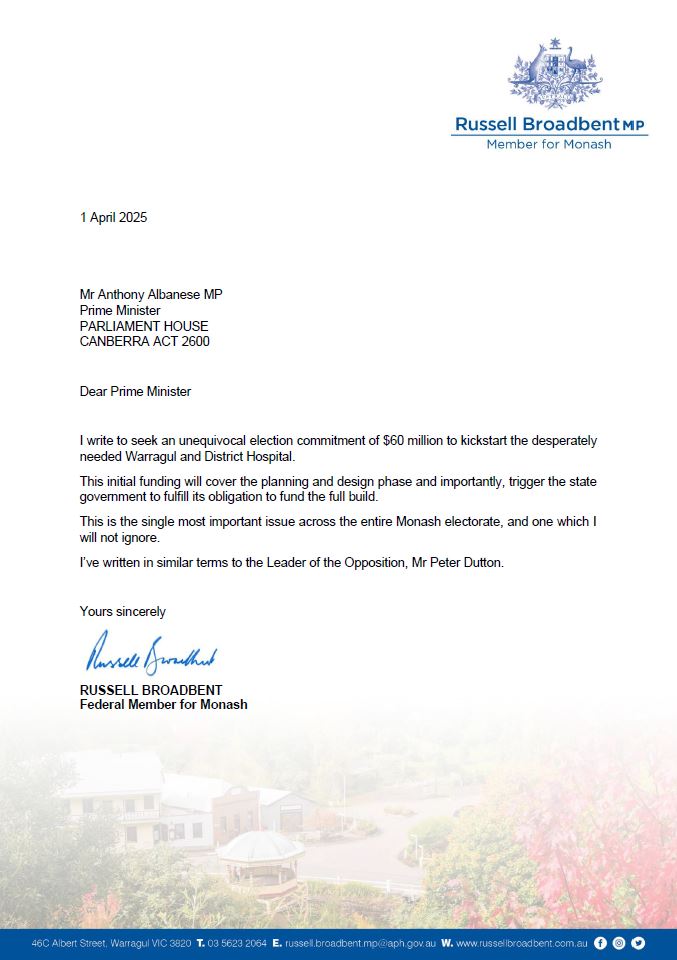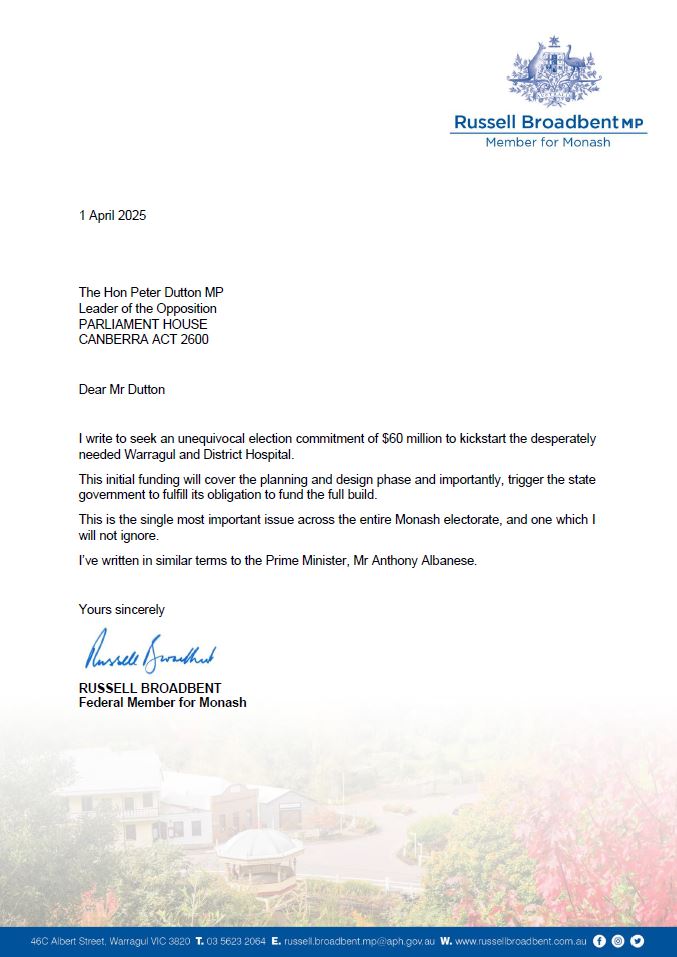Federal Member for Monash, Russell Broadbent MP, is calling on community members and local businesses to lend their support in transforming the new home of the Korumburra Women’s Shed into a fully functional and welcoming space.
Following the handover of keys to their new premises at the historic railway precinct earlier this year, the Women’s Shed is now embarking on the next crucial step - fitting out the interior. Starting from the ground up, the group requires a full range of assistance, from plumbing and kitchen installation to shelving, partitioning and essential internal fittings.
Mr Broadbent said the initiative represents far more than a physical space - it’s a vital community asset.
“The Women’s Shed is such an important community-connector and empowers members to both share and learn practical new skills,” Mr Broadbent said.
“Participation promotes positive mental health within a friendly and welcoming environment. This hub of creativity delivers a wealth of benefits to the community, so it needs all our support.”
The Korumburra Women’s Shed evolved from the successful Women on the Tools program, which teaches skills such as carpentry, metalwork, and power tool use - empowering women to build with confidence and create with purpose.
Now located in the former goods shed at the railway precinct, the group is seeking financial contributions, tools, in-kind support, and assistance from local tradespeople to help bring their vision to life.
“This is an exciting time for the Women’s Shed, and I encourage the local community -whether individuals, businesses or service providers - to rally behind them,” Mr Broadbent said.
To support the group, contact with Russell Broadbent’s office at (03) 5623 2064 or russell.broadbent.mp@aph.gov.au
Hello, I’m Russell Broadbent, Independent Member for Monash.
I’ve always stood for the people I represent — not party lines, not special interests. Right now, we need real leadership.
That’s why I’m focused on the things that matter most to our community. These include policies that:
I’m fighting to secure $60 million in federal funding to get the new Warragul Hospital underway — because healthcare in Gippsland must meet the needs of our growing population.
I believe aged care should be built on dignity — for both our elders and the carers who support them. Farmers and small businesses are the backbone of our economy.
I back policies that reduce red tape and support our farmers to propagate and produce.
On energy, I’m practical. We need affordable, reliable electricity — using the abundant resources Australia already has and ensuring community consultation.
I support open, honest dialogue about health freedom — because Australians deserve informed consent and bodily autonomy.
And most of all, I believe in integrity in government.
That means standing firm on principle, even when it’s unpopular.
I’m Russell Broadbent — and I’ll keep working for you, your family, and the future of Monash.
What fantastic news for the Fish Creek Football/Netball Club – funding for new clubrooms!
That’s right – the Federal Minister for Infrastructure, Catherine King announced over the weekend that if Labor is re-elected, $1.5 million will be given to the Fish Creek Football Netball Club for the desperately needed rebuild of their Clubrooms following the tragic fire of a couple of years ago.
The entire community of Fish Creek is to be congratulated for the tireless efforts in lobbying for this grant.
In particular, the efforts of the Club Committee, are to be given special thanks for all their efforts as they were instrumental in gaining this successful outcome.
This result shows how a united and committed community can achieve positive outcomes regardless of the odds against you.
I’m thrilled at the result and so pleased for the entire community.
Well done!
Now let’s keep our fingers crossed for an announcement about funding the first stage of the Warragul and District Hospital.
WARRAGUL:
St Paul's old Year 9 Centre at 57 Sutton St Warragul
Tuesday 22 - Thursday 24 April: 8.30am - 5.30pm
Saturday 26 April: 9.00am - 4.00pm
Monday 28 April - Thursday 1 May: 8.30am - 5.30pm
Friday 2 May: 8.30am - 6.00pm
WONTHAGGI:
Wonthaggi Senior Citizens Centre at 46-50 Murray St Wonthaggi
Tuesday 22 - Thursday 24 April: 8.30am - 5.30pm
Saturday 26 April: 9.00am - 4.00pm
Monday 28 April - Thursday 1 May: 8.30am - 5.30pm
Friday 2 May: 8.30am - 6.00pm
PHILLIP ISLAND:
Phillip Island Masonic Lodge at 93 Church St Cowes
Tuesday 22 - Thursday 24 April: 8.30am - 5.30pm
Saturday 26 April: 9.00am - 4.00pm
Monday 28 April - Thursday 1 May: 8.30am - 5.30pm
Friday 2 May: 8.30am - 6.00pm
MOE:
St Andrew's Presbyterian Church Hall at 34 Fowler St Moe
Tuesday 22 - Thursday 24 April: 8.30am - 5.30pm
Saturday 26 April: 9.00am - 4.00pm
Monday 28 April - Thursday 1 May: 8.30am - 5.30pm
Friday 2 May: 8.30am - 6.00pm

MEDIA RELEASE
Independent MP, Russell Broadbent, has warmly welcomed the Coalition’s election commitment to establish a $20 billion Rural Australia Future Fund.
Mr Broadbent said it was high time an initiative like this was implemented and hoped that it would receive bipartisan support.
“This a great initiative because rural and regional communities so often missed out on project funding at the expense of metropolitan areas,” Mr Broadbent said.
If established, the Rural Australia Future Fund would be used for health, childcare, and infrastructure projects.
“This Fund could be used to kickstart local projects such as the planning and design phase of the proposed Warragul and District Hospital, urgently needed sewerage works associated with the Fish Creek Football and Netball Club redevelopment, and urgently needed local road repairs and upgrades,” Mr Broadbent said.
“As your true independent, I support parties and policies that offer what’s best for Monash.”
ENDS
Media Contact:
Tanya Dannock, Chief of Staff
Mobile: 0407 729 637

Federal Member for Monash, Russell Broadbent MP, has announced his commitment to fight for $10 million to kickstart the planning and preparation of a recreation and sporting hub at Phillip Island.
The initial plan includes two football ovals, two soccer pitches, an aquatic centre, a dog park, and basketball and netball courts. There is also scope to cater for cricket, tennis and skateboarding.
Mr Broadbent recently met with Island Voice committee members Peter Paul and Peter McMahon to discuss the proposal.
Mr McMahon said the complex would put the entire region on the map. “This area could become a legacy project for Phillip Island because we believe it is destined to become the football headquarters for the greater region,” he said.
Building on the Island’s global reputation as a sporting venue, Mr Broadbent said the complex would further promote sports participation across the region.
“The appetite for sports participation has never been stronger and its booming across Monash communities,” Mr Broadbent said.
“We should encourage sports participation and healthy communities at every opportunity, so that’s why I’m making this commitment.”
“This landmark hub would address recreation needs now and into the future. Such a facility would encourage active lifestyles among people of all ages and backgrounds.”
The complex is to be located on the corner of Ventnor Road and Phillip Island Road in Cowes.

Independent MP Russell Broadbent is calling on all sides of politics to join him in committing $60 million to kickstart the planning and design of the new Warragul and District Hospital.
Mr Broadbent has personally written to Prime Minister Anthony Albanese and Opposition Leader Peter Dutton, urging them to visit his electorate and declare their commitment to the first stage of hospital funding.
Mr Broadbent said the funding commitment will “trigger the Victorian government to come to the party”.
He said governments can no longer ignore Monash. He highlighted the recent multi-million-dollar announcements for hospitals in marginal regions, including Pakenham and in the Western Australian seat of Hasluck.
“Just down the highway in Pakenham in a marginal electorate, funding for a new hospital is miraculously announced by the Allan Government,” Mr Broadbent said.
“I’m bringing this issue to a head once and for all. That’s my commitment.
Mr Broadbent said in the event of a hung parliament, “no one will get my support unless they commit to the hospital.”


The announcement today by the Trump administration is a slap in the face for the nation's beef export industry.
Here in Gippsland, we have a number of first-class export abattoirs that supply top quality beef to the US market.
These businesses will find life considerably tougher as a result of these new tariffs and have every right to feel angry and frustrated with today's announcement.
It will only lead to increased costs in the US market whilst penalising Australian beef producers in the process.
The imposition of these tariffs is not the action of a friend and one of Australia's closest allies. It is a hostile action and one which I will be fighting in every way possible.
Our beef is renowned not only for its rich flavour and tenderness, but also our strict quality and biosecurity standards. Our farmers will never waiver from those high standards and neither should we when showing them our support.
Hi, Russell Broadbent, your Independent Member for Monash.
Today, I’m calling on the Prime Minister and Peter Dutton, to visit my electorate of Monash and announce their commitment to fund the new Warragul Hospital.
Yesterday I wrote to both leaders inviting them to commit to the first stage of funding—$60 million—to get this vital project underway.
This funding will trigger the state government to come to the table and it’s key to unlocking the full build of the Warragul and District Hospital.
On top of that, the federal government must also commit to delivering the Monash on-site medical training facility—an education hub that will support the next generation of local health professionals right here in Gippsland.
It’s clear the major parties are taking this electorate for granted. They think they can ignore Monash and still win your support. Well, I’m here to tell them—they won’t.
People continue to ask me who I’ll support in the event of a hung parliament?
Well, let me give you a straight answer:
My priority in this campaign is the Warragul and District Hospital.
I will not support either side unless they commit to the hospital before election day, that’s my commitment!
I’m bringing this issue to a head—once and for all.
No commitment, No support. It’s that simple.
Thanks for listening.
While the nation may be watching the seat of Monash, I’ll be focused on local issues in my electorate.
Monash needs a representative with experience, tenacity and strength to represent this great region. As an experienced independent, not beholden to any group or individual, I can achieve more for the people of Monash.
I’ve been humbled by the encouragement I’ve received right across the electorate and incredibly grateful for the army of volunteers who have offered to support my campaign.
As your independent representative, I’ll bring all my experience and knowledge to the table in Canberra to work in the best interests of the people of Monash.
I can’t be bought and neither can our electorate.
Hello Russell Broadbent here – your independent member for Monash.
Today I spoke in the parliament about my grave concerns regarding the government’s unreasonable, unethical and unconscionable No Jab, No Pay policy.
My speech was inspired by a powerful letter written to me by a young mother, Chloe, who’s been financially punished for failing to adhere to the government’s immunisation schedule.
I want to honour Chloe by reading her letter in full to you:
Chloe told me that:
Since 2016, this policy has withheld key government entitlements; The Family Tax Benefit Part A supplement and childcare subsidies, from families who choose not to vaccinate their children in accordance with the national schedule.
This is not just another health regulation. It is, to this day, the only federal law in Australia and in the wider world, that ties a person’s access to government financial support to their compliance with a specific medical procedure.
We’re not talking about schooling, or border control, or emergency quarantine powers. We’re talking about welfare payments—a cornerstone of Australia’s social safety net—being used as leverage against private medical choices. This is not a health policy. It is a coercion policy. And it targets those least able to absorb the loss—young families, single parents, and low-income Australians already doing it tough.
We pride ourselves on giving everyone a fair go. But what’s fair about punishing struggling families for making a personal health choice? What’s Australian about using a child’s entitlements to force their parents into line?
This wasn’t just a one-off policy, it was the beginning of a slippery slope. Once we allowed the government to tie medical procedures to financial support, it became easier to tie it to jobs, to travel, to participation in society. We are now reaping the consequences of letting coercion become part of the public health toolkit.
We’re told this is for the greater good. But coercion is not good policy. It’s lazy governance.
Even the World Health Organization—so often invoked in public health debate—expert advisory group, SAGE warns that mandates must be approached with great care, as the potential negative consequences may outweigh the benefits—an implicit call for any such measure to be proportional to the risk it seeks to address.
In the case of No Jab No Pay, there was no national emergency. No outbreak. No extraordinary risk to justify this kind of pressure. There was only policy-making by ideology—using the blunt tool of financial punishment to enforce medical compliance.
Let’s contrast that with the WHO’s global strategy on immunisation through to 2030—the Immunization Agenda 2030, or IA2030. It highlights the importance of:
Nowhere—nowhere—does it endorse coercion. Nowhere does it recommend withholding family welfare as a strategy to increase vaccine uptake.
Instead, it emphasizes people-centred approaches that build trust and promote informed decision-making.
Trust. Informed decision-making. These are not radical ideas. These are the cornerstones of ethical healthcare.
And that’s what’s been lost under No Jab No Pay. The ability to have a conversation. The ability to weigh risks and benefits. The ability to decline a medical product without facing financial reprisal from your own government.
This policy has not increased confidence in vaccination. It has eroded trust in public health and created a generation of Australians who feel bullied by the very institutions meant to support them.
We must be better than this.
We must stand for informed consent, not enforced compliance. We must return to a framework where health decisions are personal, not political—and where families are not punished for asking questions.
Repealing No Jab No Pay is not an anti-vaccine position. It is a pro-choice, pro-ethics, pro-democracy position.
Because in a free society, the government should never hold your child’s welfare hostage to your medical decisions.
The line was crossed. It’s time we drew it back.
The government’s No Jab No Pay policy - which withholds the Family Tax Benefit Part A supplement and childcare subsidies from families who choose not to vaccinate their children in accordance with the national schedule is unreasonable, unethical and unconscionable in a free and democratic country like ours.
And it’s the only law in the world that ties a person’s access to government social support payments to compliance with a medical procedure!
Welfare payments being used as coercive leverage against parents for personal health choices, targeting parents least able to absorb a loss of payments, punishing young families, single parents, and low-income Australians who are already doing it tough.
Coercion is not good policy - it’s lazy and unethical governance.
It erodes trust in public health and undermines informed decision-making – two cornerstones of safe and ethical healthcare.
But it seems daring to question a doctor about vaccines – how safe is it? what’s in it? has it been tested? is seen as a radical and extremist concept.
You’d have thought the ability to have a conversation - weigh risks and benefits - and decline a medical product without facing fear of financial reprisal from your own government would be the automatic right of any person or parent – and not just a right, but encouraged!
We must be better than this! We must stand for informed consent, not enforced compliance. We must return to a framework where health decisions are personal, not political —and where families are not punished for asking questions.
Repealing No Jab No Pay is not an anti-vaccine position. It’s a pro-choice, pro-ethics position.
The government should never hold your child’s welfare hostage to your medical decisions.
The line has been crossed and it’s well past time we drew it back.